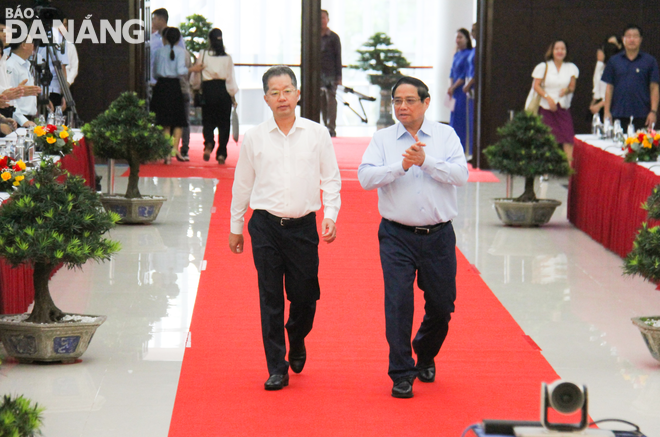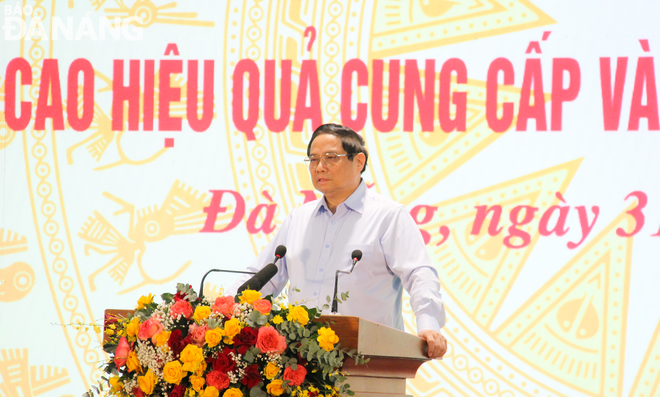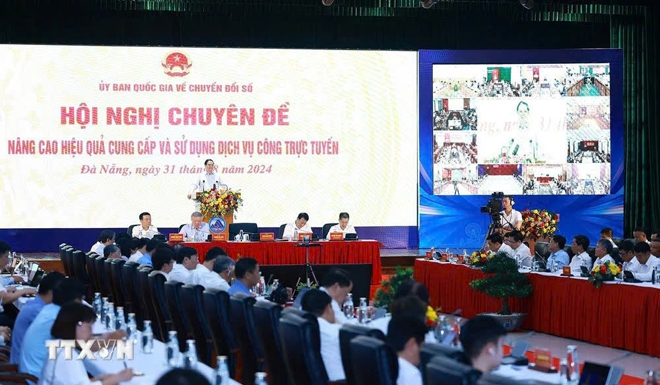PM Pham Minh Chinh chairs Da Nang conference on online public service efficiency
Prime Minister (PM) cum Chairman of the National Committee on Digital Transformation Pham Minh Chinh on Saturday chaired an online national conference in Da Nang on improving the efficiency of providing and using online public services.
 |
| Prime Minister Pham Minh Chinh (right) and Secretary of the Da Nang Party Committee Nguyen Van Quang attend and co-chair the national conference on enhancing the efficiency of providing and using online public services, August 31, 2024. Photo: M.Q |
The event was also co-chaired by Permanent Deputy PM Nguyen Hoa Binh; Senior Lieutenant General, Minister of Public Security Luong Tam Quang; Minister of Information and Communications Nguyen Manh Hung; Secretary of the Da Nang Party Committee cum Head of the National Assembly Deputies’ Delegation of Da Nang Nguyen Van Quang.
Other outstanding attendees were the Head of the Government Office; leaders of national ministries and branches; the leaders of Da Nang and other localities.
Delivering his opening speech, PM Pham Minh Chinh underlined a need to focus on reviewing the targets set by the 13th National Party Congress. In particular, tasks that have been done well should be performed better.
Explaining the reason for choosing Da Nang as the locality to host this conference, PM Pham Minh Chinh affirmed that Da Nang is the leading locality in building a digital transformation programme. Digital transformation has three pillars: Digital Government, Digital Society and Digital Economy.
With a regard to the construction of Digital Government, many localities have actively implemented it, but Da Nang gained many outstanding achievements. Therefore, choosing Da Nang aims to demonstrate high praise for this central Vietnamese city and encourage other cities and provinces nationwide to follow Da Nang’s steps in this field.
According to PM Pham Minh Chinh, the trend of digital transformation is an objective requirement, a strategic choice, a top requirement in the development process. The current development trend is digital transformation that is the focus of the ongoing 4th Industrial Revolution.
Digital transformation has not only been about the digital economy and society, but has also entered other aspects, including important national issues. Transformation is an issue related to the whole world, comprehensively, and for all people. The current approach is a global, comprehensive, and all-people approach, but it still has to have a focus and key points. The key point here is the people.
 |
| Prime Minister Pham Minh Chinh delivers a speech at the conference. August 31, 2024. Photo: M.Q |
Digital transformation aims at the effective provision and use of public services. Thus, both the providers and users of public services must apply digital transformation effectively. Therefore, this conference discussed solutions requiring both State management and beneficiaries to enhance the efficiency of activities through digital transformation.
In recent times, the national government and localities have done a lot of work on digital transformation. It can be said that digital transformation strongly promotes the development of not only the public and private sectors, from the national to local levels, each subject in the way of ‘going to every alley, knocking on every door’.
In reality, there have been positive changes in thinking, actions and habits recorded in administrative agencies at all levels when making a shift from traditional paper-based documents to online ones, hereby helping to enhance work efficiency.
According to the PM, in addition to the cited positive results, the implementation of digital transformation still has shortcomings, limitations and inadequacies.
He emphasised that people can make history, State resources only offer a guide. Therefore, it is important to mobilise resources from businesses and people and base on reality to adjust institutions accordingly.
The development of digital technology products is first of all to serve the needs of people and businesses well and to reach out to the world. Especially in the current context of integration, we cannot do it alone. We must speed up integration and promote national strength with the power of the times to carry out digital transformation missions.
Based on the above-mentioned issues, the PM emphasised a must to assess awareness, thinking, leadership, direction and implementation to bring best possible the benefits to the people and businesses, promote good models, effective ways, valuable experiences that need to be spread.
It is a need to identify what problems happening, what institutional issues needing to be resolved and implemented; whether or not the people and businesses are the centre, what issues the State needs to resolve, in order to determine what solutions need taking in the coming time to effectively implement the goals set out by the 13th National Party Congress.
According to the conference’s report, Viet Nam has gone through two stages of development of online public services since 2011. Stage 1 was the initial stage when the number of high-level online public services deployed was very modest nationwide whilst Stage 2 marked extensive development when a breakthrough was made in online public service numbers.
 |
| The national conference is in progress, August 31, 2024. Photo: M.Q |
The implementation of online public services has been successful but uneven among ministries, branches and localities. Some localities achieved a very high rate of up to 69%, however, there were still many others with a very low rate of less than 5%, the average of the provincial segment only reached 17.9%.
Full-process online public services bring real efficiency when citizens and businesses can simply and conveniently perform the entire process in the internet and do not have to be present at State agencies for having their administrative dossiers handled, as shown through the high rate of full-process online records.
To enter the stage of in-depth development, it is necessary to focus on popularising full-process online public services to all citizens and businesses with a goal of rate of full-process online records reaching 70%.
The popularisation of full-process online public services will bring all activities taken by civil servants and public employees serving people and businesses to the online environment, and at that time, State agencies will have full digital data to deliver instructions and administration online and based on data.
Completing the popularisation of full-process online public services, Viet Nam will complete the task of developing e-Government and then moving to digital Government.
Reporting by MAI QUE –Translating by A.THU, P.TRA